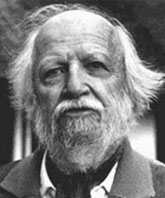Alfred Bester
Critique • Works • Views and quotes

Born
New York City, US, 1913
Died
Doylestown, Pennsylvania, 1987
Publications
Novels, stories, plays, poetry, screenplays
Genres
Novels, stories, scripts, comics, travel writing
Writing language
English
Place of writing
United States
Literature
• The Stars My Destination (1956)
Novels
• The Demolished Man (1953)
• The Stars My Destination (1956)
American Literature
• The Stars My Destination (1956)
Science Fiction
• The Demolished Man (1953)
• The Stars My Destination (1956)
Science Fiction Stories
• "Fondly Fahrenheit" (1954)
On books, writers and writing
1972
There's no doubt that Isaac Asimov is the finest popular science writer working today, and in my opinion Ike is the finest who has ever written; prolific, encyclopedic, witty, with a gift for colorful and illuminating examples and explanations. What makes him unique is the fact that he's a bona fide scientist—associate professor of biochemistry at Boston University School of Medicine—and scientists are often rotten writers. Read the novels of C.P. Snow and the short stories of Bertrand Russell, if you want proof. But our scientist professor, Asimov, is not only a great popular science author but an eminent science fiction author as well. He comes close to the ideal of the Renaissance Man.
In Publisher's Weekly
1974
God in heaven, I can't tell you how my life was racked up by [James Joyce's] Ulysses. The last year that I was with Holiday, we did an issue with a photo essay on Bloomsday in Dublin. I had to do the caps for the pictures, and in capsule form tell the entire plot of Ulysses, which I had only read about fourteen thousand times. I had to refresh my memory, so I reread it, very rapidly. It's not that the book didn't stand up, it's that we had grown apart. It's a young man's book.... When you're older, and more mature, and more interested in subjectivity, how can you possibly be as captivated by this book, which is the epitome, the last word in objective writing? It's like a surgeon's scalpel, it's that cold-blooded, and brilliant in its analysis. I need warmth when I read. And that's why I say that the book did not stand up for me—only because we'd grown apart.
Interview with Guy Lillian III
1976
I write out of fever. I cannot write anything until I'm so saturated with it, involved with it, bursting with it, that it must come out or I will have no rest.
Over the years I've evolved a technique for igniting this fever. It starts with outlining, first general, then increasingly detailed as the story develops. When I have what I believe to be the final outline (it never is), I begin running the story through my head over and over again, not in words, I don't tell it to myself, but in a sort of sensory cinema. I listen to the sound, visualize the scenes, feel the tempo of the characters and their conflicts.
It's at this point the pacing begins.... The pacing and the repetitions continue, the heat mounts, and, if I'm lucky, the ignition point is reached. Then I run like hell for the typewriter.
"Comment on Fondly Fahrenheit" in The Light Fantastic
Who can forget the impact of [Stanley G.] Weinbaum's "A Martian Odyssey"? That unique story inspired an entire vogue for quaint alien creatures in science fiction.... Alas Weinbaum fell apart and degenerated into a second-rate fantasy writer, and died too young to fulfill his original promise.
And then came [John W.] Campbell who rescued, elevated, gave meaning and importance to science fiction. Why, in God's name, didn't he come first? Even today science fiction is still struggling to shake off its pulp reputation, deserved in the past but certainly not now.
"My Affair with Science Fiction" in Star Light, Star Bright
.

